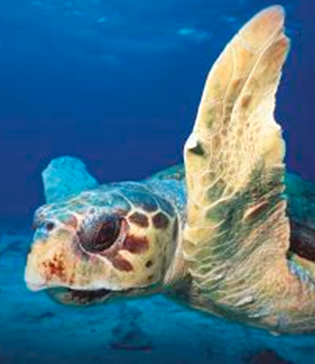Scott HEPPELL, Oregon State University, USA
Matt MULVEY, University of Utah, USA
Frank Emmanuel ZACHOS, Natural History Museum in Vienna, Austria
Andrej SOVINC, IUCN WCPA Regional Vice-Chair Europe
Scott Heppell has obtained his PhD in 1998. He is an Associate Professor at the Department of Fisheries and Wildlife, Oregon State University. His research interests are the physiological ecology of fishes, in particular how physiology, behavior, and life history traits affect the interactions between fish populations and their respective fisheries. He has worked on bluefin tuna on the Atlantic high seas, Mediterranean, and east coast of the United States, on groupers throughout the southeast Atlantic, Caribbean, and Gulf of Mexico, on rockfish in Oregon and Alaska, and on trout, steelhead, and salmon in Japan and the high deserts of eastern Oregon and Northern Nevada. He collaborates with academic scientists, state and federal agencies, foreign agencies and universities, and commercial and recreational fishermen, in order to address issues related to the sustainability of marine and freshwater resources and their ecosystems.
Matt MULVEY, University of Utah, USA
Matt Mulvey is Professor in the Department of Pathology, University of Utah, Salt Lake City. He is focused on understanding the survival and virulence strategies of important bacterial pathogens collectively known as Extraintestinal Pathogenic Escherichia coli, or ExPEC. These bacteria can efficiently colonize the gastrointestinal tract like commensal strains, but have the added capacity to disseminate and cause disease in other host niches, such as central nervous system, the urinary tract and the blood. ExPEC strains are responsible for some of the most common infections on the planet and are gaining resistance to antibiotics at an alarming rate. Prof. Mulvey is investigating to delineate both bacterial and host factors that control the ability of ExPEC to colonize and persist within diverse environments, with a major goal being development of new anti-bacterial therapeutics. His research utilizes genetics, microscopy, biochemistry, global gene expression analysis, and molecular biology techniques coupled with cell culture, mouse, and zebrafish infection model systems.
Prof. Mulvey has authored 8 chapters, is one of three editors of a book entitled Urinary tract infections:Molecular pathogenesis and Clinical Management and has published 55 original and review articles, including in Science (2013 IF=31), Nature Rev Microbiol (IF in 2013 above 22), J Immunol, Curr Opin Microbiol, PLOS Pathogens, Blood and JBC. Frank Emmanuel ZACHOS, Natural History Museum in Vienna, Austria
Frank E. Zachos is head of the Mammal Collection at the Natural History Museum in Vienna, Austria. He studied biology and philosophy in Kiel and Jena, Germany, and got his PhD from Kiel University in 2005 with a dissertation on genetic diversity and fluctuating asymmetry in roe deer. He then spent some further years in Kiel as a postdoc and assistant professor before taking up the position in Vienna. Frank is an evolutionary zoologist working mainly on ungulates, carnivores and birds of prey, focusing on population genetics, biogeography and conservation. He also has a keen interest in theoretical issues of evolutionary biology and systematics/phylogenetics, most of all species concepts and their bearing on taxonomy and conservation.
Andrej has obtained his PhD in Protected area systems in Slovenia. For the last three years he holds the position of the IUCN WCPA Regional Vice-Chair Europe. Andrej is also lecturer in the MSc programme Management of protected areas in Klagenfurt (Austria) and in the BSc programme Biodiversity at the University of Primorska. Andrej has both a theoretical and practical background in the management of protected areas, since he has been leading the Secovlje Salina Nature Park in Slovenia for the last twelve years.
Heidi Christine HAUFFE, Fondazione Edmund Mach, Department of Biodiversity and Molecular Ecology, Research and Innovation Centre, Italy
Heidi is trained in Evolutionary Biology and established a genetics laboratory at the Centro di Ecologia Alpina, Trento, Italy, in 1997. Now at the Fondazione Edmund Mach, her research interests range from the causes and effects of biodiversity loss (emerging pathogens) and gain (speciation), rodent-borne viruses (especially the Ljungan virus), and conservation genetics of alpine species. All her research is multi-disciplinary and she has strong collaborations across Europe and beyond. She is currently involved in three EU projects: EDENext, EuroWestNile and CONgress.
Heidi Christine HAUFFE, Fondazione Edmund Mach, Department of Biodiversity and Molecular Ecology, Research and Innovation Centre, Italy
Heidi is trained in Evolutionary Biology and established a genetics laboratory at the Centro di Ecologia Alpina, Trento, Italy, in 1997. Now at the Fondazione Edmund Mach, her research interests range from the causes and effects of biodiversity loss (emerging pathogens) and gain (speciation), rodent-borne viruses (especially the Ljungan virus), and conservation genetics of alpine species. All her research is multi-disciplinary and she has strong collaborations across Europe and beyond. She is currently involved in three EU projects: EDENext, EuroWestNile and CONgress.

